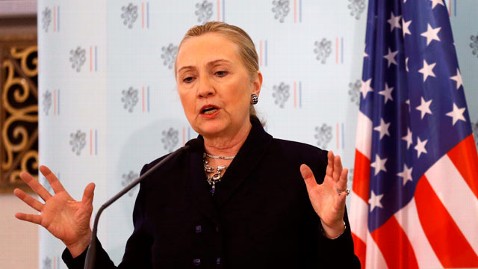CAIRO (Reuters) - Egypt's Republican Guard ordered rival demonstrators to leave the area around the presidential palace in Cairo on Thursday after fierce overnight clashes that killed seven people.
Islamist supporters of President Mohamed Mursi withdrew, but the opposition promised more protests there.
The presidency announced that the Republican Guard, whose duties include protecting the palace, had set a 3 p.m. (1300 GMT) deadline for supporters and opponents of Mursi to quit an area they had turned into a battleground.
The military played a big role in removing President Hosni Mubarak during last year's popular revolt, taking over to manage a transitional period, but had stayed out of the latest crisis.
Mursi's Islamist partisans had fought opposition protesters well into the early hours during dueling demonstrations over the president's decision last month to expand his powers to help him push through a mostly Islamist-drafted constitution.
A Reuters witness said the hundreds of Mursi supporters who had camped overnight near the palace perimeter left before the military deadline passed. Dozens of Mursi's foes remained, but were kept away by a barbed wire barricade guarded by tanks.
An official of the opposition National Salvation Front, who asked not to be named, said more protests would take place.
"We are planning marches later today, most probably taking off from Tahrir Square, disregarding the Republican Guard's decision. We had many injuries last night, and we are not going to have their blood wasted."
The commander of the Guard, which has deployed tanks and armored troop carriers to help police pacify the area, said the intention was to separate the adversaries, not to repress them.
"The armed forces, and at the forefront of them the Republican Guard, will not be used as a tool to oppress the demonstrators," General Mohamed Zaki told the state news agency.
Mursi himself, silent in the turbulence of the last few days, will address the nation later in the day, state television quoted a presidential adviser as saying.
The president discussed how to stabilize Egypt with the army chief, General Abdel Fattah al-Sisi, who is also defense minister, and cabinet ministers, the presidency said.
After the sustained clashes of Wednesday night, the streets around the palace were much calmer in the morning, apart from a brief bout of rock-throwing between the hundreds of Islamists and dozens of opposition partisans still at the scene.
STABILITY AT RISK
Army officers on the spot urged the combatants to back off and stop bloodshed that is further dividing Egypt and imperiling its quest for political stability and economic recovery nearly two years after mass protests overthrew Mubarak.
Officials said 350 people had been wounded, as well as the seven killed. Six of the dead were Mursi supporters, the Muslim Brotherhood said. Each side blamed the other for the violence.
Egypt plunged into renewed turmoil after Mursi assumed wide powers on November 22 to press ahead with a mostly Islamist-drafted constitution and forestall any court challenges to it.
The Supreme Guide of the Brotherhood, to which Mursi belonged before he was narrowly elected president in June, appealed for unity. Divisions among Egyptians "only serve the nation's enemies", Mohamed Badie said in a statement.
With at least seven tanks at the palace corners, backed by about 10 armored troop carriers and 20 police trucks, the two sides mostly shouted slogans at each other from a distance.
Around the palace, traffic moved through streets strewn with rocks thrown during violence in which petrol bombs and guns were also used. Hundreds of Mursi supporters had remained there over night, many wrapped in blankets and some reading the Koran.
"We came here to support President Mursi and his decisions. He is the elected president of Egypt," said demonstrator Emad Abou Salem, 40. "He has legitimacy and nobody else does."
Opposition protester Ehab Nasser el-Din, 21, his head bandaged after being hit by a rock the day before, decried the Muslim Brotherhood's "grip on the country", which he said would only tighten if the new constitution is passed.
Another protester, Ahmed Abdel-Hakim, 23, accused the Brotherhood of "igniting the country in the name of religion".
WESTERN CONCERN
The United States, worried about the stability of an Arab state which has a peace deal with Israel and which receives $1.3 billion in U.S. military aid, has urged dialogue. Britain also called for restraint and an "inclusive" political process.
Mursi's opponents accuse him of seeking to create a new "dictatorship" with his November 22 decree and were further angered when an Islamist-dominated assembly hastily approved the draft constitution due to go to a referendum on December 15.
The president has defended his actions as necessary to prevent courts still full of judges appointed by Mubarak from derailing a constitution vital for Egypt's political transition.
Mursi has shown no sign of buckling under pressure from protesters, confident that the Islamists, who have dominated both elections since Mubarak was overthrown, can win the referendum and the parliamentary election to follow.
Mahmoud Hussein, the Brotherhood's secretary-general, said holding the plebiscite was the only way out of the crisis, dismissing the opposition as "remnants of the (Mubarak) regime, thugs and people working for foreign agendas".
As well as relying on his Brotherhood power base, Mursi may also tap into a popular yearning for stability and economic revival after almost two years of political turmoil.
The Egyptian pound hit its lowest level in eight years, after previously firming on hopes that a $4.8 billion IMF loan would stabilize the economy. The Egyptian stock market fell 4.4 percent after it opened.
Foreign exchange reserves fell by nearly $450 million to $15 billion in November, indicating that the Central Bank was still spending heavily to bolster the pound. The reserves stood at about $36 billion before the anti-Mubarak uprising.
(This story has been corrected to show Egypt's pound hits lowest level in eight years, but did not fall 4 percent)
(Additional reporting by Tom Perry; Writing by Alistair Lyon; Editing by Giles Elgood)










